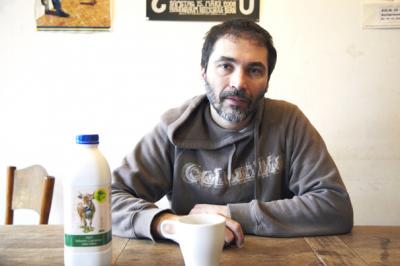An Infinitely Crazy World
The Swiss-Italian musician and composer Paed Conca and Lebanese artist Raed Yassin have been working together since 2005 as Duo Praed. The two of them have released their second CD Made in Japan.
Praed, the duo of Bernese Paed Conca and Lebanese Raed Yassin lures the curious listener into a mazy media-carousel. On their second release Made in Japan (Annihaya), pop sounds meet experimental techniques. Acoustic offerings from yesteray are presented today: Raed Yassin sings over a sample of Egyptian pop-star Mahmoud El Husseini, mimes the solo entertainer on keyboard and synthesizer, while a bathroom-pipe is bursting. Japanese voices, screaming, rifle volley and dub-grooves are interlaced. Sounds and rhythms circle boundlessly, just like the carousel at the fun fair – they also use those dusty nostalgic acoustic patterns: tacky cheapo sounds and pounding drums draw endless circles and aim nowhere. All these sounds are put into a grinder and are processed with techniques of experimental music: primed double- and E-bass, varying playing techniques on the clarinet and scratches from record players and tape-recorders. It is a commentary about the randomness, oppositeness and purposelessness of the acoustic materials that are surrounding us. A plead for an infinite, crazy and open world.
Interview with Paed Conca

[Thomas Burkhalter]: Paed Conca, you work with your projects more abroad than in Switzerland. Where have you been lately?
[Paed Conca]: I play in the internationally well-connected scene of free improvised music, but I also compose from contemporary to chamber music. The last few months I performed in Germany, Italy, Belgium, Holland, Sweden and Norway, plus every now and then also in Japan and Lebanon.
[TB]: Today you live half of the time in Beirut. How come?
[PC]: Switzerland is too small if you want to live from free improvised or experimental music. But I also don’t want to limit myself to Switzerland. I am curious. The music scene in Beirut works much closer with other art fields: actors, artists, graphic-designers. I find this extremely enriching. I’ve been working in a duo with Raed Yassin for five years: I like his experiments with local popular culture. Such unobstructed handling of popular culture is more and more difficult to find amongst European musicians and listeners of experimental music.
[TB]: Indeed on your new CD Made in Japan, the Duo creates peculiar musical worlds. What are we hearing?
[PC]: We pull many things through the grinder: audio tracks of old Egyptian or Japanese movies, speeches of Arabian dictators, propaganda music, field recordings from the Lebanese civil war, and many other things. As a fairly new thing we also process rhythms, sounds and voices from Arabian popular music. Especially the Dabké-wedding musicians from Syria and Lebanon as well as the Chaabi-street-stars from Egypt did it for us. We processed their trashy-kitschy sounds and ornaments with our experimental approach – with much love for small details. I prime my E-bass with various materials and play clarinet with special techniques. Raed Yassin mimes the solo entertainer on the synthesizer or manipulates pop sounds on the record player or tape recorder. It is experimental music that sounds like pop music. These days, people even dance to our music. However it remains crazy and infinite, that’s why I feel so happy in it.

[TB]: All those acoustic materials that you process: do they stand for anything political?
[PC]: We do play in our music and in our performances with political indicators. For example we manipulate the sound aesthetics of various Lebanese parties and put them ironically into new contexts. Raed Yassin likes to wear on stage the typical mirror-sunglasses of the Christian right radical party leaders, while playing the music of Shiites and Sunnites on his synthesizer. Basically, with our music, we plea for politics of openness: everybody shall be able to create his/her world however they think is right.
[TB]: How does this position manifest itself relating to Switzerland?
[PC]: Europe with its isolation and paranoia of everything and everybody scares me. I am a very political person. I want to take position, sometimes directly, other times indirectly. Last year, in my music, film and paint project «Porta Chiusa», I critically dealt with the Swiss foreign policy. Each human shall be able to travel wherever (s)he wants to go. Raed Yassin has a Lebanese passport, as an artist it is nearly impossible to live like this. I constantly keep writing invitations and visa-applications for him, in order to be able to meet and play concerts as Duo Praed. Somehow, also this is reflected in the music of Praed: though playful, hidden and abundant of delight.
Concert Extracts from Reitschule Bern

Norient spoke to Praed in the context of the project Sonic Traces: From Switzerland.
Biography
Published on November 19, 2010
Last updated on June 03, 2021
Topics
Music and art that dealing with the unfinished and undefined.
What happens, when artists move from one to another country? For example, when an Arab artist replaces the big tractors in her the village with big jeeps of the West.
About fees, selling records, and public funding: How musicians strive for a living in the digital era.

